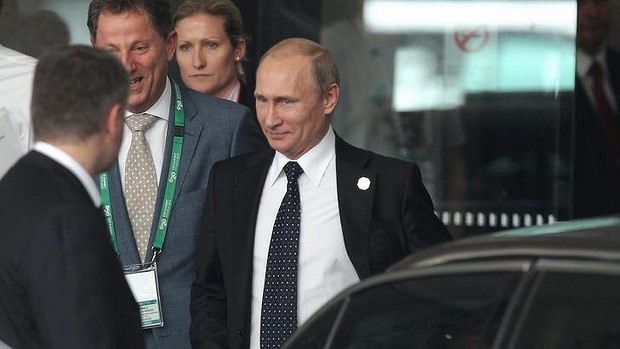Russian President Vladimir Putin has left the G20 summit in Australia before it officially ends.
He faced fierce criticism from Western leaders on Saturday over the Ukraine conflict but described the summit as constructive and useful.
World leaders are focusing on economic growth on the second and final day of the summit in Brisbane.
They have agreed a plan to grow their economies by 2% more than expected by 2018.
Mr Putin said he was leaving before the release of the official communique on Sunday because of the long flight to Russia and he wanted to get some sleep.
The Russian president said: “Some of our views do not coincide, but the discussions were complete, constructive and very helpful”.
US President Barack Obama is due to meet European leaders to discuss a co-ordinated response to what they see as Russia’s destabilisation of Ukraine.
On Saturday, Canadian Prime Minister Stephen Harper, US President Barack Obama and British Prime Minister David Cameron all sharply criticised Mr Putin.
The Kremlin denies that it has sent military forces or heavy weapons to pro-Russia rebels in eastern Ukraine.


The US and the European Union have put in place a series of sanctions against Russia since its annexation of Crimea from Ukraine in March.
In a television interview on Saturday, Mr Putin called for an end to sanctions, saying they harmed the world economy as well as Russia.
‘Brisbane Action Plan’
Finance ministers from G20 countries drew up plans in February to boost global growth by 2% in five years.
The BBC’s James Landale in Brisbane says this is “a pretty ambitious target” for many G20 countries that are struggling with recession or little growth.
The key question is what the G20 actually agrees to do to meet this target, our correspondent says.
How it is achieved will be announced later on Sunday in the “Brisbane Action Plan”.
“We cannot rest, the world needs growth,” Joe Hockey, Australia’s Treasurer said.
Climate change is expected to be mentioned in the G20 leaders’ final communique on Sunday, following pressure from the US and European leaders.
In other developments, President Obama met the leaders of Japan and Australia on the sidelines of the summit and they called for the peaceful resolution of maritime disputes in the South China Sea.
Mr Obama warned on Saturday that Asia’s security must not be based on intimidation of small nations by big ones, but on mutual alliances.
He did not mention China explicitly but he warned of the dangers posed by territorial disputes in the South China Sea, where Beijing’s actions have raised concern among its neighbours.
Mr Obama said there was “no question” over his commitment to Asia-Pacific allies.
Meanwhile, G20 leaders released a statement in which they vowed to do all they could to “extinguish” the Ebola outbreak in West Africa.
It said that member states were committed to do what was necessary “to ensure the international effort can extinguish the outbreak and address its medium-term economic and humanitarian costs”.
Source: BBC


